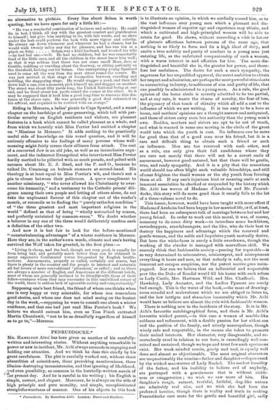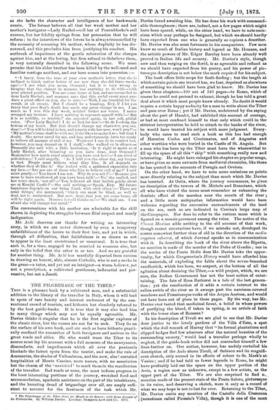PENRUDDOCKE.*
MR. HAMILTON AIDE' has here given us another of his carefully- written and interesting stories. Without anything remarkable in power or new in incident, Mr. Aide always succeeds in engaging and holding our attention. And we think he does this chiefly by his great carefulness. The plot is carefully worked out, without those absurdities of coincidence, those provoking anachronisms, those illusion, destroying inconsistencies, and that ignoring of likelihood, /yid even possibility, so common in the hurriedly-written novels of '1'ne present day. And he is careful in his writing ; his English is simple, correct, and elegant. Moreover, he is always on the side of high principle and pure morality, and simple, unsophisticated straightforwardness of manner. One of his objects in this book Penruddocke. By Hamilton AMC. London: Hurst and Blacken, is to illustrate an opinion, in which we cordially second him, as to the vast influence over young men which a pleasant and dis- tinguished woman of superior age and experience may obtain, and which a cultivated and high-principled woman will be able to retain for good. He shows, without conceding a whit in favour of platonic affections between persons of the same age, that nothing is BO likely to form and fix a high ideal of duty, and excite a true nobility and purity of conduct in a young man just entering life, as the unfettered companionship of such a woman, with a warm interest in and affection for him. The more dis- tinguished and beautiful she is, the greater her power, and there- fore her usefulness. The desire for such a one's sympathy, the eagerness for her unqualified approval, the secret ambition to obtain her respect and admiration, are perhaps the most powerful stimulants to unremitting industry, to nobleness of aim and purity of life, that can possibly be administered to a young man. As a rule, the good opinion of the home circle is secretly admitted to be too partial, and at any rate, it wants the charm of novelty, the fear of loss, the piquancy of that touch of chivalry which all add a zest to the influence of which we are writing. It is too easy to be a hero at home, and mothers' opinions are a thought narrow and antiquated, and those of sisters carry even less authority than the young man's own. Besides, mothers and sisters are apt to be out of reach, and what is wanted is some one moving in the circle of the great world into which the youth is cast. No influence can be more for good than that of a good man over his friend, but it is a rare and difficult thing to obtain such a friend or such an influence. Men are too reserved with each other, and as a rule, can only give their full confidence where they are sure not merely that there will not be a covert smile of amusement, however good-natured, but that there will be gentle, true, and ready sympathy. And it is a pity that the censorious world should too often blight such valuable friendships, and still oftener frighten the timid woman or the shy youth from forming them at all. If any one's injurious hint or meaning smile at such innocent association be checked or suspended by the history which Mr. Aide has woven of Madame d'Arnheim and Mr. Penrud- docke, this story will do more good than it usually falls to the lot of a three-volume novel to do.
This lesson, however, would have been taught with more effect if Aladamed'Arnheim had been happy in her married life, or if, at least, there had been no subsequent talk of marriage between her and her young friend. In order to work out this moral, it was, of course, necessary to do some dirty work—to introduce some backbiters, eavesdroppers, scandalmongers, and the like, who do their best to destroy the happiness and advantage which the reserved and gentle woman, and the noble and impulsive youth mutually derive. But here the wickedness is surely a little overdrawn, though the working of the slander is managed with marvellous skill. We scarcely think that fashionable society—passing for reputable—is so very determined to misconstrue, misinterpret, and misrepresent everything it hears and sees, so that nobody is safe, not the most innecent act escapes suspicion, nor the purest motive goes unim- pugned. Nor can we believe that an influential and respectable peer like the Duke of Kendal would fill his house with such refuse as Lady Castle, Mrs. Hartman Wild, and Mrs. Chaffiuch. Mrs. Hawkeley, Lady Ancaster, and the Ladies Pynsent are surely bad enough. This is the worst of the book,—the mass of drawing- room scandal and malevolence which we are obliged to listen to, and the low intrigue and shameless immorality which Mr. Aide would have us believe are almost the rule with fashionable women.
There is nothing new in the incidents of the story. It is in Mr. Aide's favourite autobiographical form, and there is Mr. Aide's favourite wicked parent,—in this case a woman of marble-like coldness and refinement, with a double passion for her eldest son and the position of the family, and utterly unscrupulous, though wisely safe and respectable, in the means she takes to promote their united interests. Her character, very disagreeable, and re- morselessly cruel in relation to our hero, is exceedingly well con-• ceived and sustained, though we hope and trust few such specimens exist. Her weak-minded cousin, gossip and tool, is equally well done and almost as objectionable. The most original characters are unquestionably the cousins—father and daughter—dispossessed by the wicked mauosuvres of Lady Rachel. The modest humility of the father, and his inability to believe evil of anybody, are portrayed with a genuineness that is without sickli- ness or exaggeration ; we wish we saw more of him. His daughter's rough, earnest, truthful, faithful, dog-like nature are admirably real also, and we wish she bad been the preferred heroine, though there is reality and truth in making Penruddocke care more for the gentle and beautiful girl, sadly
as she lacks the character and intelligence of her backwoods cousin. The former believes all that her weak mother and her mother's instigator—Lady Rachel—tell her of Penruddocke's evil courses, but her fidelity springs from her persuasion that he will reform ; in the interviews of the lovers he is always trammelled by the necessity of screening his mother, whose duplicity he has dis- covered, and this precludes him from justifying his conduct. His outbreak of impatience at the gentle reiteration of the charges against him, and at the loving, but firm refusal to disbelieve them, is very naturally described in the following scene. We must premise that his elder brother has been killed by the well-used and familiar carriage accident, and our hero comes into possession :—
" fancy, from the tone of your own mother's letter, that she is inclined to think rather better of me now than she did three weeks ago.'—' I see what you mean, Osmund ; but it is very wrong to imagine that the change in mamma has anything to do with—with your altered position. You are come home at last, and are reconciled to dear Lady Rachel; and mamma says that this awful event must pro- duce a great effect on you, she is sure.'—' Well, I am thankful for the - result, at all events. But I should be a humbug, Evy. if I let you fancy that poor Ray's death has made any great change in me. I am much as I was this day week, neither bettor nor worse. I never wronged my brother. I have nothing to reproach myself with.'—' But it is so terrible, so terrible !' she repeated again, in her soft, pitiful voice. 'Poor Lady Rachel ! I do so feel for her.'—' So do I—from the bottom of my heart. But that doesn't change my character, you see, dear.'—' You will be kind to her, and remain with her now, won't you ?'— ' My mother's home shall be with me, if she likes to make it so ; but that I doubt. She never cared for me, and has, unfortunately, been too ready to believe all manner of evil of me. Whatever I can do to comfort her, however, you may depend on it I shall.'—She walked on in silence.— Presently she said with a little hesitation, Is it right to speak so of Lady Rachel, after behaving as you have done, dear Osmund ? Remember how much cruel anxiety you have cost her.'—' I am tired of self-defence,' I said angrily. As I told you the other day, my tongue is tied. People must believe what they like. It all depends on whether they do like it.' She looked with a saddened expression into my face.-4 Are you one of those who like to believe evil of me ?' I said more gently.—' You know I am not. Why do you ask ?'—' Because you seem to have swallowed all you have been told.'—' No,' she replied, and
her voice shook, 'not You believed all that 'foolish gossip about me at Kendal Castle ?'—She said nothing.—' Speak, Evy. My future happiness depends on our being frank with each other.'—' There are some things,' she murmured. 'which one must be blind, as well as deaf, not to understand. But now, dear, that you are come home, all will be right again. Mamma herself thinks so.'—' We shall see. I am afraid she will change her mind.' "
The conversations -with his mother are admirable for the skill
shown in depicting the struggles between filial respect and manly indignation.
Mr. Aide deserves our thanks for writing an interesting story, in which we are never distressed by even a temporary unfaithfulness of the lovers to their first love, and yet in which, through all difficulties, that faithfulness is so drawn as not to appear in the least overstrained or unnatural. It is true that each is, for a time, engaged to be married to someone else, but only in the belief that the other is so too. And we are grateful for another thing. Mr. Aide, has manfully departed from custom in drawing an honest, able, sincere Catholic, who is not a snake in the grass—a tutor, and yet not an intriguer—a warm believer, yet not a proselytiser, a cultivated gentleman, influential and per- suasive, but not a Jesuit.



































 Previous page
Previous page